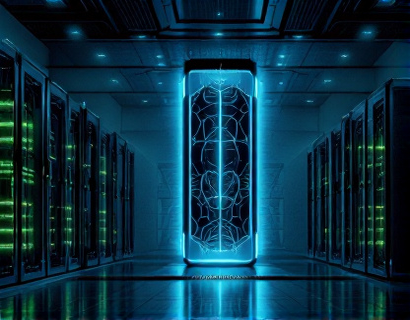Maximizing Token Value with Advanced Smart Contract Locking for Long-Term Investment Opportunities
In the rapidly evolving landscape of blockchain technology, investors and businesses are continually seeking innovative methods to enhance their investment strategies and secure their digital assets. One such method gaining prominence is the use of advanced smart contract solutions designed to lock tokens for long-term incentives. This approach not only maximizes token value but also optimizes investment potential, ensuring maximum security and transparency. By leveraging smart contracts, stakeholders can create robust mechanisms that foster trust within the blockchain ecosystem, setting a new standard in smart contract applications.
The concept of locking tokens using smart contracts involves deploying a contract that restricts the transferability of tokens for a predetermined period. This locking mechanism serves multiple purposes, including incentivizing long-term holding, reducing market volatility, and enhancing the utility of tokens. For investors, locked tokens represent a commitment to the project's success, thereby increasing their value over time. For businesses, this strategy can stabilize token prices and build a loyal community of supporters who are invested in the project's long-term growth.
Enhancing Token Utility
Token utility is a critical factor in the success of any blockchain project. By implementing advanced smart contract locking mechanisms, projects can significantly enhance the utility of their tokens. Locked tokens can be used to create governance structures where token holders have a say in the project's development and decision-making processes. This democratic approach not only increases user engagement but also aligns the interests of token holders with the project's success.
Moreover, locked tokens can be utilized in reward systems, where users are incentivized to contribute value to the ecosystem through activities such as content creation, moderation, or participation in community events. These rewards can be structured to increase in value over time as the locked tokens appreciate, further motivating users to remain active and invested in the project.
Fostering Trust and Security
Trust is paramount in the blockchain ecosystem, and advanced smart contract locking mechanisms play a crucial role in building and maintaining this trust. Smart contracts are inherently transparent and immutable, ensuring that the terms of the locking agreement are clearly defined and cannot be altered once deployed. This transparency reassures investors and users that their tokens are securely locked and managed according to the agreed-upon rules.
Security is another significant advantage of using smart contracts for token locking. Traditional methods of locking tokens, such as using centralized exchanges or third-party services, come with inherent risks of hacking, fraud, and mismanagement. Smart contracts eliminate these risks by automating the locking process and storing the tokens directly on the blockchain. This decentralized approach ensures that no single entity has control over the locked tokens, reducing the likelihood of malicious activities.
Optimizing Investment Strategies
For investors, the ability to lock tokens using advanced smart contracts offers a strategic advantage in optimizing their investment portfolios. By locking tokens for a specified period, investors can lock in gains and protect their investments from market volatility. This strategy is particularly beneficial in highly volatile markets where token prices can fluctuate dramatically in short periods.
Additionally, smart contract locking mechanisms can be designed to release tokens at strategic times, such as milestones achieved by the project or upon reaching certain performance metrics. This structured release can create a steady demand for the tokens, helping to stabilize and potentially increase their value over time. Investors can thus benefit from a more predictable and controlled investment environment, reducing uncertainty and enhancing returns.
Boosting Token Value
The locking of tokens through advanced smart contracts can significantly boost token value in several ways. First, the commitment demonstrated by token holders through locking their assets signals confidence in the project's future. This collective confidence can attract more investors, increasing the overall demand for the token and driving up its price.
Second, locked tokens contribute to the token's scarcity, which is a fundamental driver of value in digital assets. As the supply of locked tokens remains fixed, the available supply for trading decreases, potentially leading to higher prices. This scarcity effect is particularly pronounced in projects with a strong community and clear use cases, where the locked tokens represent a significant portion of the total supply.
Third, the enhanced utility and security provided by smart contract locking mechanisms can lead to greater adoption and usage of the token within the ecosystem. As more users adopt the token for various purposes, such as governance, rewards, and transactions, the token's network effect strengthens, further boosting its value.
Case Studies and Real-World Applications
Several blockchain projects have successfully implemented advanced smart contract locking mechanisms to enhance token value and optimize investment strategies. One notable example is a decentralized finance (DeFi) platform that locked a significant portion of its native token to incentivize long-term holding and participation in the ecosystem. By doing so, the platform not only stabilized its token price but also created a robust governance system where token holders could propose and vote on critical updates and improvements.
Another example is a gaming blockchain that used smart contract locking to reward players for contributing to the game's growth. Tokens locked by active players were used to fund development, reward top contributors, and create a stable token economy. This approach not only increased the token's utility but also fostered a loyal community of players who were invested in the game's success.
Challenges and Considerations
While the benefits of advanced smart contract locking mechanisms are clear, there are several challenges and considerations that projects must address to implement these solutions effectively. One key challenge is the technical complexity involved in designing and deploying secure and efficient smart contracts. Projects must ensure that their contracts are thoroughly audited to prevent vulnerabilities and potential attacks.
Another consideration is the user experience. Locking tokens should be a seamless and user-friendly process to encourage adoption. Projects need to provide clear guidelines and support to help users understand the benefits and mechanics of token locking. Additionally, projects should consider the liquidity implications of locking tokens, ensuring that there is a balance between locking for long-term incentives and maintaining sufficient liquidity in the market.
Future Trends and Innovations
The use of advanced smart contract locking mechanisms is likely to evolve with the broader blockchain landscape. One emerging trend is the integration of locking mechanisms with other blockchain features, such as decentralized autonomous organizations (DAOs) and non-fungible tokens (NFTs). By combining these technologies, projects can create more sophisticated and dynamic token economies that offer enhanced incentives and utility.
Another area of innovation is the development of self-upgradable smart contracts, which allow for the modification of locking parameters without the need for a new contract deployment. This flexibility can address changing market conditions and project needs, ensuring that the locking mechanism remains relevant and effective over time.
Furthermore, the rise of cross-chain interoperability is opening new possibilities for token locking across different blockchain networks. Projects can leverage cross-chain solutions to create multi-chain locking mechanisms, expanding the utility and reach of their tokens while enhancing the overall ecosystem's resilience and growth potential.
Conclusion
Advanced smart contract locking mechanisms represent a powerful tool for maximizing token value and optimizing investment strategies in the blockchain ecosystem. By enhancing token utility, fostering trust, and providing a secure and transparent investment environment, these solutions set a new standard in smart contract applications. As the blockchain landscape continues to evolve, projects that embrace and innovate within this space will be well-positioned to thrive and lead the way in digital asset management and investment.










































